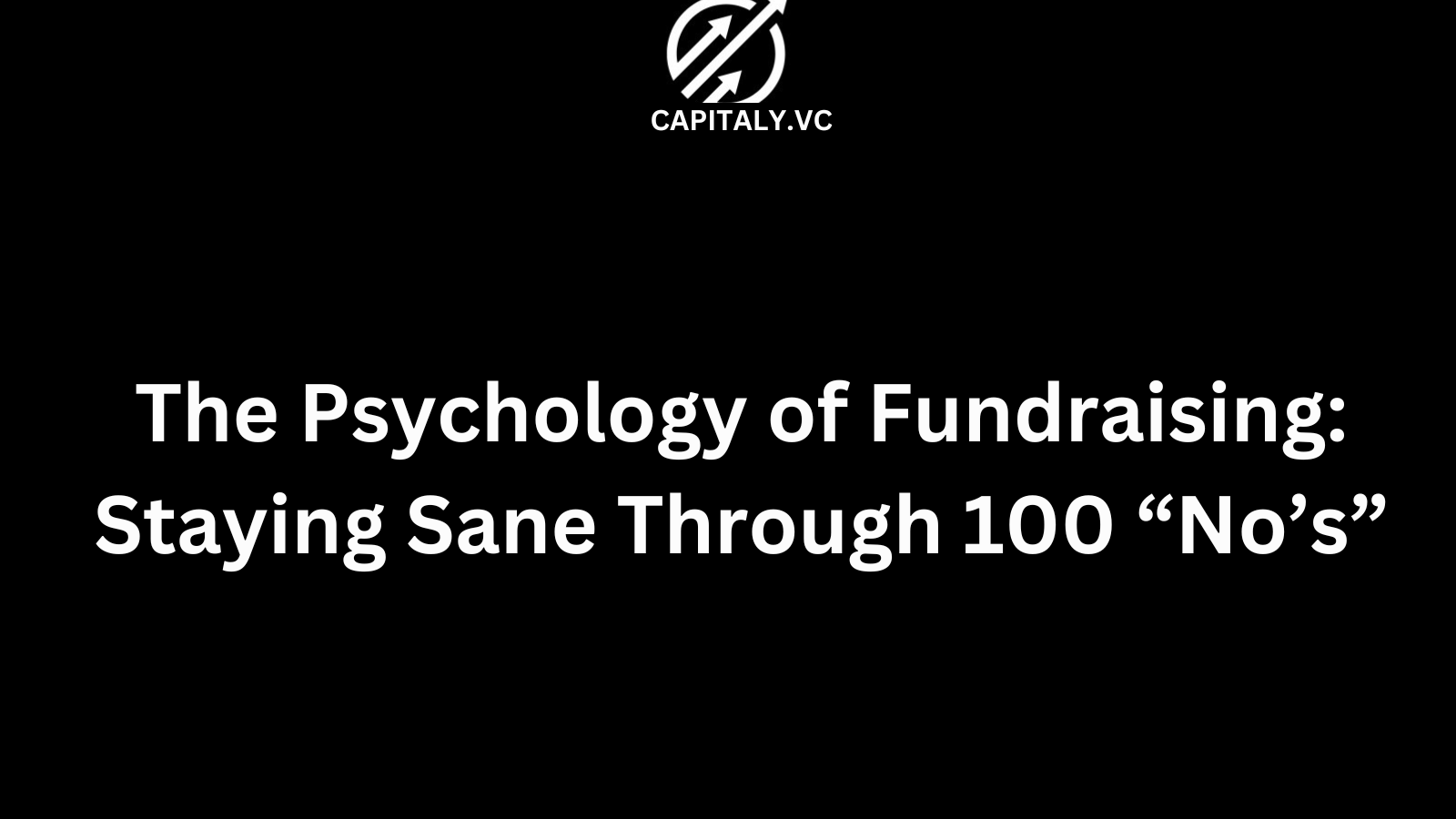The Psychology of Fundraising: Staying Sane Through 100 “No’s”
The Psychology of Fundraising: Staying Sane Through 100 “No’s”

Let’s be honest.
Fundraising can mess with your head.
Even the best founders hear "no" — over and over.
And if you’re not prepared mentally, the process can break you before you even close.
This post unpacks the psychology of fundraising, the mental traps to avoid, and real strategies to stay sane, sharp, and in control through the storm of rejection.

1. Rejection Is the Default — Not the Exception
You’re not crazy.
You’re just playing a numbers game.
Top-tier founders hear 80–100 “no’s” before a “yes.”
That’s not failure. That’s normal.
👉 Related: Fundraising Horror Stories (and How to Avoid Them)
2. VCs Aren’t Rejecting You — They’re Filtering Risk**
They’re not saying:
- You’re bad
- Your startup is dumb
- You’re not credible
They’re often saying:
- “We don’t understand this space”
- “It’s not in our thesis”
- “We don’t have the bandwidth”
Detach ego from outcome.
3. Rejection Still Hurts — And That’s Okay
Even when you know it’s not personal, it still stings.
What helps:
- Naming the emotion
- Talking it out with a founder friend
- Reframing the rejection as data, not identity
Don’t suppress it. Process it — and move on.
4. Fundraising Exposes All Your Imposter Syndrome
Every “no” reinforces your inner voice:
- “Am I even cut out for this?”
- “What if I’m wasting everyone’s time?”
- “Do I sound like I know what I’m doing?”
Here’s the truth:
Every founder feels this.
Even post-IPO founders. Especially the best ones.
5. Momentum Is the Antidote to Doubt
You don’t need confidence. You need action.
When fundraising drags on:
- Keep building
- Keep emailing
- Keep refining your story
- Keep closing customers
Momentum quiets fear.
6. You’re Not Alone — Even if It Feels Like It
Fundraising is one of the loneliest phases for founders.
But you’re not the only one:
- Getting ghosted after a second meeting
- Bombing investor Q&A
- Crying after a cold email session
Find a founder community or group chat.
Talk. Vent. Share wins and losses.
👉 Join us: Why Capitaly.vc Is the Ultimate Founder Community for Raising Capital
7. Build a Mental Firewall for Investor Feedback
VCs will:
- Misunderstand you
- Give conflicting advice
- Project their own fears onto your pitch
Take what’s useful. Ignore the rest.
Not every opinion deserves weight.
8. Set Rejection KPIs
Weird hack, but it works:
- Aim for 100 “no’s”
- Track them in a CRM
- Celebrate every new rejection
It turns pain into progress.
You’re not failing — you’re advancing the funnel.
👉 Use: Fundraising CRM for Startups: The Ultimate Guide
9. Design Your Day to Withstand Emotional Whiplash
One investor says “love it.”
Another ghosted.
Third sends a list of concerns.
Your head spins.
Create structure:
- Mornings = deep work
- Afternoons = investor calls
- Evenings = recovery rituals
Don’t let their chaos become your calendar.
10. Your Identity ≠ Your Startup
The biggest trap?
You become your pitch.
Every “no” feels like a rejection of your soul.
Don’t tie your self-worth to funding.
You are not your startup.
You’re a whole person building something brave.
FAQs: Psychology of Fundraising
1. Is it normal to feel emotionally wrecked during a raise?
Yes. Even seasoned founders feel it.
2. How do I deal with constant rejection?
Reframe it. Normalize it. Use it as data to refine your pitch.
3. Should I take investor feedback seriously?
Only if it's consistent across multiple people — otherwise, it’s noise.
4. How long should I mentally prepare to fundraise?
Plan for 8–12 weeks minimum. Some take 6 months.
5. What if I feel like giving up?
Take a short break, not a full stop. Talk to other founders. Regroup.
6. Should I share my fundraising struggles publicly?
Maybe. Building in public can build momentum and attract help.
7. How do I bounce back after a brutal “no”?
Write it down. Go for a walk. Call someone who gets it. Then keep going.
8. What tools help with mental resilience?
Founder communities, Capitaly CRM, journaling, sleep, and no more coffee after 2 PM.
9. What’s a sign I’m pushing too hard?
Fatigue, cynicism, and short temper. Take a weekend off.
10. Will it get easier in future rounds?
Yes — but only if you build systems, not stress cycles.
Conclusion
Fundraising isn’t just a numbers game — it’s a mental game.
You’ll face rejection, doubt, and pressure.
But you’ll also find clarity, grit, and growth.
Remember:
- “No” doesn’t mean “never”
- Rejection ≠ identity
- You only need one yes
Subscribe to Capitaly.vc Substack (https://capitaly.substack.com/) to raise capital at the speed of AI — without losing your mind in the process.


.png)